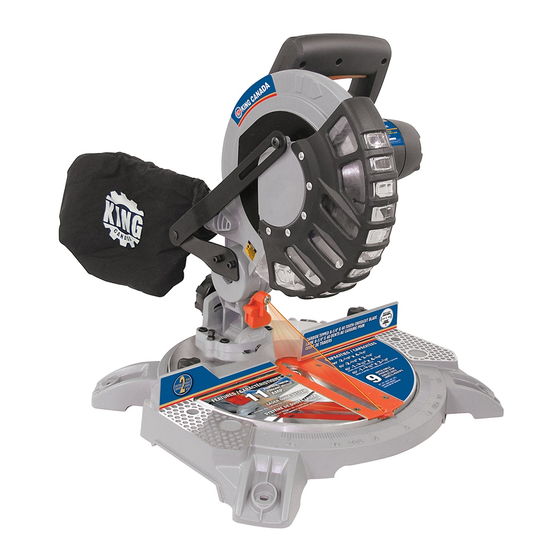
Subscribe to Our Youtube Channel
Summary of Contents for King Canada 8320SC
-
Page 1: Instruction Manual
KING CANADA 8-1/4” COMPOUND MITER SAW 09/2013 WITH LASER GUIDE *Enhanced Laser Effect MODEL: 8320SC INSTRUCTION MANUAL COPYRIGHT © 2013 ALL RIGHTS RESERVED BY KING CANADA TOOLS INC. -
Page 2: Warranty Information
LIMITED TOOL WARRANTY King Canada makes every effort to ensure that this product meets high quality and durability standards. King Canada warrants to the original retail consumer a 2-year limited warranty as of the date the product was purchased at retail and that each product is free from defects in materials. -
Page 3: General Safety Instructions
GENERAL SAFETY INSTRUCTIONS VOLTAGE WARNING: Before connecting the tool to a power source (receptacle, outlet, etc.) be sure the voltage supplied is the same as that specified on the nameplate of the tool. A power source with voltage greater than that for the specified tool can result in SERIOUS INJURY to the user - as well as damage to the tool. - Page 4 ADDITIONAL SAFETY INSTRUCTIONS FOR COMPOUND MITER SAWS 1. WARNING: USE ONLY CROSS-CUTTING SAW BLADES. 19. MAKE SURE blade is not contacting workpiece before switch is WHEN USING CARBIDE TIPPED BLADES, DO NOT USE turned on. BLADES WITH DEEP GUILLETS AS THEY CAN DEFLECT AND CONTACT GUARD.
-
Page 5: Electrical Connections
12-16 EXTENSION CORDS FIGURE 2 The use of any extension cord will cause some loss of power. Use the TOOL SPECIFICATIONS Model ......................................8320SC Voltage ......................................110V Input power ....................................11 Amp. No load speed ..................................5,500 RPM Blade size..................................8-1/4” x 40 teeth Arbor size ......................................5/8”... - Page 6 UNPACKING, ASSEMBLY AND ADJUSTMENTS UNPACKING 1. Remove all loose parts from the carton. 2. Remove the packing materials from around the saw. 3. Carefully lift the saw from the carton and place it on a level work surface. 4. The saw has been shipped with the saw head locked in the down position. To release the saw head, push down on the top of the saw arm, pull then turn the saw head release knob (A) Fig.12.
- Page 7 ADJUSTMENTS SETTING THE BLADE SQUARE WITH THE TABLE 1. Make sure that the electrical plug is removed from the main power supply. 2. Push the saw head down to its lowest position, then pull and turn the head release knob to hold the saw head in the transport position. 3.
- Page 8 ADJUSTMENTS SETTING THE FENCE SQUARE WITH THE BLADE 1. Make sure that the electrical plug is removed from the main power supply. 2. Push the saw head down to its lowest position, then pull and turn the head release knob to hold the saw head in the transport position. 3.
-
Page 9: Cutting Operations
OPERATIONS CUTTING OPERATIONS CROSSCUTTING A crosscut is made by cutting across the grain of the workpiece. A 90 crosscut is made with the miter and the bevel angle set at 0 1. Pull and turn the saw head release knob (A) Fig.12 and lift the saw head to its full height. - Page 10 OPERATIONS CUTTING OPERATIONS COMPOUND CUT A compound cut involves using a miter angle and a bevel angle at the same time. It is used in making picture frames, to cut mouldings, making boxes with sloping sides and for roof framing. Always make a test cut on a piece of scrap wood before cutting into good material. 1.
- Page 11 REPLACING/INSTALLING BLADE REPLACING/INSTALLING BLADE DANGER! • Never attempt to use a blade larger than the stated capacity of the saw (8-1/4”). It will come into contact with the blade guards and housing. • Never use a blade that is too thick to allow the outer blade flange to engage with the flats on the spindle.
-
Page 12: Maintenance
MAINTENANCE MAINTENANCE All the ball bearings are sealed and lubricated for life and will require no maintenance. Cleaning • After use, wipe off chips and dust adhering to the tool with cloth or the like. Keep the blade guards and covers clean. Lubricate moving parts with machine oil to prevent rust.













Need help?
Do you have a question about the 8320SC and is the answer not in the manual?
Questions and answers